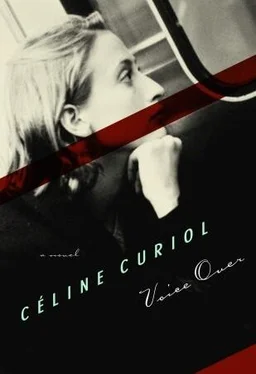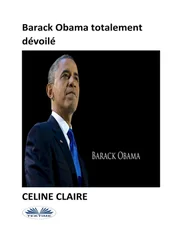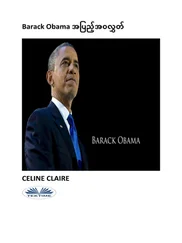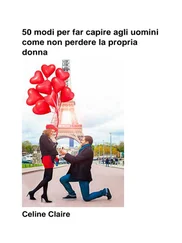Celine Curiol - Voice Over
Здесь есть возможность читать онлайн «Celine Curiol - Voice Over» весь текст электронной книги совершенно бесплатно (целиком полную версию без сокращений). В некоторых случаях можно слушать аудио, скачать через торрент в формате fb2 и присутствует краткое содержание. Год выпуска: 2008, Издательство: Seven Stories Press, Жанр: Современная проза, на английском языке. Описание произведения, (предисловие) а так же отзывы посетителей доступны на портале библиотеки ЛибКат.
- Название:Voice Over
- Автор:
- Издательство:Seven Stories Press
- Жанр:
- Год:2008
- ISBN:нет данных
- Рейтинг книги:5 / 5. Голосов: 1
-
Избранное:Добавить в избранное
- Отзывы:
-
Ваша оценка:
- 100
- 1
- 2
- 3
- 4
- 5
Voice Over: краткое содержание, описание и аннотация
Предлагаем к чтению аннотацию, описание, краткое содержание или предисловие (зависит от того, что написал сам автор книги «Voice Over»). Если вы не нашли необходимую информацию о книге — напишите в комментариях, мы постараемся отыскать её.
Voice Over — читать онлайн бесплатно полную книгу (весь текст) целиком
Ниже представлен текст книги, разбитый по страницам. Система сохранения места последней прочитанной страницы, позволяет с удобством читать онлайн бесплатно книгу «Voice Over», без необходимости каждый раз заново искать на чём Вы остановились. Поставьте закладку, и сможете в любой момент перейти на страницу, на которой закончили чтение.
Интервал:
Закладка:
The following afternoon, on her way back from the gare du Nord, she drops by a stationer’s. She chooses a sheet of wrapping paper. Multicolored lines on a grey background. The paper is smooth and has a satin finish. The man behind the counter rolls it into a slender tube, over which he slips an elastic band. Leaving the shop, she wonders how she should hold it. It could be a sword or a walking stick, or a magic wand. She ends up tucking it under her arm. Because, obviously, what she is carrying is a baguette.
Ange is in mid-conversation as she opens the door. She seems pleased to see her and gives her a kiss on both cheeks before ushering her into the hallway. The fragrance of boeuf bourguignon fills the apartment. Her arms are still in the sleeves of her jacket as Ange takes hold of the collar to hang it up. She says, I’m late, but gets no answer from Ange. She keeps her handbag with her. The zip wouldn’t work after she put the package inside, trying not to crumple the wrapping paper, which was already damaged at the corners. Ange is about to charge into the living room, majestic in her high heels, when she holds her back by the arm. I have something for you. As best she can, she extracts the package from her bag. Ange’s eyes fix on the multicolored lines as her fingers eagerly press the wrapping paper. Seconds later, the paper is on the floor and in Ange’s large hands the sweater suddenly resembles a small furry black animal. Ange likes it — she hasn’t seen the Promod label yet, not to mention the magnetic security disc. Ange puts the sweater down on a chair. I’ll introduce you. He has appeared in the doorway to the kitchen. He smiles at her, but Ange is already leading her off to present her to the other guests.
There are four men and two women. Some are standing, some are sitting, as if they were posing for a photograph. When she follows Ange into the room they freeze, look her over, size her up and she finds this collective evaluation irksome. She kisses the women, shakes hands with the men, which they always find a bit surprising. But that’s how she prefers it; she doesn’t have to explain. It’s always the same: whenever she touches a person for the first time, her eyes have a tendency to look off to the side. But now she makes an effort, she wouldn’t want them to assume immediately that she is shy. Ange enunciates first names. She recognizes her own but doesn’t remember any of the others. She doesn’t do it on purpose: her memory refuses to register that kind of thing the first time round. Ange invites her to sit down. Somewhat laboriously, the conversations get going again. The two women perched on the sofa offer her embarrassed smiles. No excess emotion, no sudden effusions: they’re figuring out how to interact under the circumstances. She looks at third fingers and counts two wedding rings. Which leaves only two possibilities as to who the guy she is supposed to like might be. Ange presses a glass of white into her hand, then, just as quickly, beats a hasty retreat to the kitchen, where he is busy stirring solids and liquids in a large pot. As for her, she has no right to see him until he is good and ready. His hair must smell of onion and bay leaf, his forehead of the salt from his sweat. In the meantime, she turns her attention to the two bachelors. Neither one pays her any attention, engaged as they are in a discussion that requires all the seriousness they can muster. One has a slight stoop, gesticulates a lot; the other has metal-framed glasses and from time to time runs the tip of his tongue over his lips. The couple sitting on the other couch have stopped talking in low voices. They are inspecting the contents of the room, he from the right, she from the left, to be sure they won’t miss a thing. A real bit of teamwork. They’ll compare notes when they go to bed: what they liked, what they might eventually buy for themselves. Even so, she detects a hint of boredom stirring in her neighbors. Her silent presence is beginning to be embarrassing. It won’t be long, she senses, before someone tries to draw her out. She takes a sip of white wine so as to seem busy. The husband sits up and leans slightly towards her, about to ask a question. At which point Ange sweeps into the living room, barks out, dinner’s ready, and makes everyone jump. She suddenly feels like saying to Ange, who is increasingly agitated, that they’re not deaf, but instead she just sketches a faint smile in the direction of the husband and wife to show that she has noted their intention to enter into oral communication with her.
Everyone heads meekly over to the table. Ange assigns places; someone points out that there are nine people present and it won’t be possible to seat men and women alternately. She hangs back and takes a quick look inside the kitchen. He has his hands in the water, his head tilted back as he blows locks of hair from in front of his eyes. After a few seconds, he senses that she is watching him. He gives her a wink and whispers, I’m coming. I’m coming: a promise that has the effect of an order. If only there were just the two of them, she wishes, in this archetypal early twenty-first-century kitchen. Because now she understands “I’m coming” to mean “leave me alone,” and not “I’ll be with you in a second.” She retreats. The outside world has suddenly shrunk, and the inside has become dense and enormous. She tells herself that she must look like the Michelin-tire man. But no one seems to mind. She proceeds robotically over to the table and, without thinking, flops down onto an empty chair. She didn’t realize straight away that she was the one Ange was speaking to. The tone of voice is impatient. No, not there, that’s my place. Ange points a commanding finger at another chair at the end of the table. She says nothing. She gets up and slips in between one of the husbands and the man with the stoop. There now remains just one empty seat, directly opposite hers, reserved for the chef, who at last makes his entrance. A thunderous chorus of “Ahhs” from the guests, the metal sound of cutlery. Each plate contains a small triangle of toast, a dollop of crème fraîche, and a slice of smoked salmon. She is going to have to force herself. Smoked salmon is served at one out of every two dinner parties she is invited to. She recalls the supermarket slogan: “Chic and cheap.” It feels as if she is chewing an oily piece of salted rubber. This show-dinner is starting to get on her nerves. As she sits there eating her slice of dead fish, searching for a way not to feel sick, the guests resume their conversation, now that their stomachs have been gratified. They are discussing one of the couples’ most recent trips. To Iran. The woman keeps going on about how she had to wear a veil over there. The others adopt sympathetic demeanors; as for her, she seems to have found it rather amusing. She even tells Ange and the other woman that if they ever decide to go, she’ll give them the address of the shop where she bought the cloth for the veil.
The plates are empty; Ange is clearing the table. After retreating to his laboratory under the watchful eye of his partner, he returns with a steaming casserole of boeuf bourguignon. Everyone holds out a plate to the chef, who serves the food himself. She takes advantage of the profusion of outstretched arms to give the porcelain a discreet wipe with her napkin and rid it of some of the salmon taste. Hardly has she done so than the man with the stoop grabs her plate and declares in a loud voice, Ladies first. Here then is the young man who has been reserved for her. Charming; perhaps he’d also like a round of applause? Someone says, it’s crazy how Le Pen. . General approbation, use is made of the words “alarming,” “worrying,” “sad.” They all seem to have given the problem quite some thought. She notes that they take pleasure in agreeing. That strikes her as a bit sterile. Timidly, she puts her question: out of interest, do you have many French people of North African extraction among your acquaintances? Looks fly in all directions. I mean, it’s a strange term, French of North African extraction. One of the husbands fixes her with an annoyed stare. I really don’t see the connection. Neither do the others apparently. She looks to the end of the table for support, but he is leaning over to Ange and not looking in her direction. The husband is back on the attack, his tone more aggressive. And you, Miss, do you know many? She can’t stand people who use the word Miss to remind you that you are less mature or more unmarried than they are. It’s not Miss, actually, she would like to shoot back. That would have put him in his place. Luckily, Ange, ever the perfect hostess, enquires if everyone is enjoying the delicious meal lovingly concocted by her boyfriend lover fiancé partner sweetheart, i.e. the guy she allows herself to be groped by. But since everyone is waiting to hear if the girl at the end of the table knows, might one go so far as to say frequents — what was it she called them? — French people of North African extraction, Ange’s question goes unanswered. Do you like it? asks Ange again. Everyone makes mmm sounds with their mouths; compliments are made to the chef and to his hostess. A moment of true harmony. But the husband has not lost the scent: from the look in his eyes, she sees that he regrets not being able to sink his teeth into that piece of woman whose discretion gives him the right to pick on her. The conversation resumes, but she is no longer following.
Читать дальшеИнтервал:
Закладка:
Похожие книги на «Voice Over»
Представляем Вашему вниманию похожие книги на «Voice Over» списком для выбора. Мы отобрали схожую по названию и смыслу литературу в надежде предоставить читателям больше вариантов отыскать новые, интересные, ещё непрочитанные произведения.
Обсуждение, отзывы о книге «Voice Over» и просто собственные мнения читателей. Оставьте ваши комментарии, напишите, что Вы думаете о произведении, его смысле или главных героях. Укажите что конкретно понравилось, а что нет, и почему Вы так считаете.












